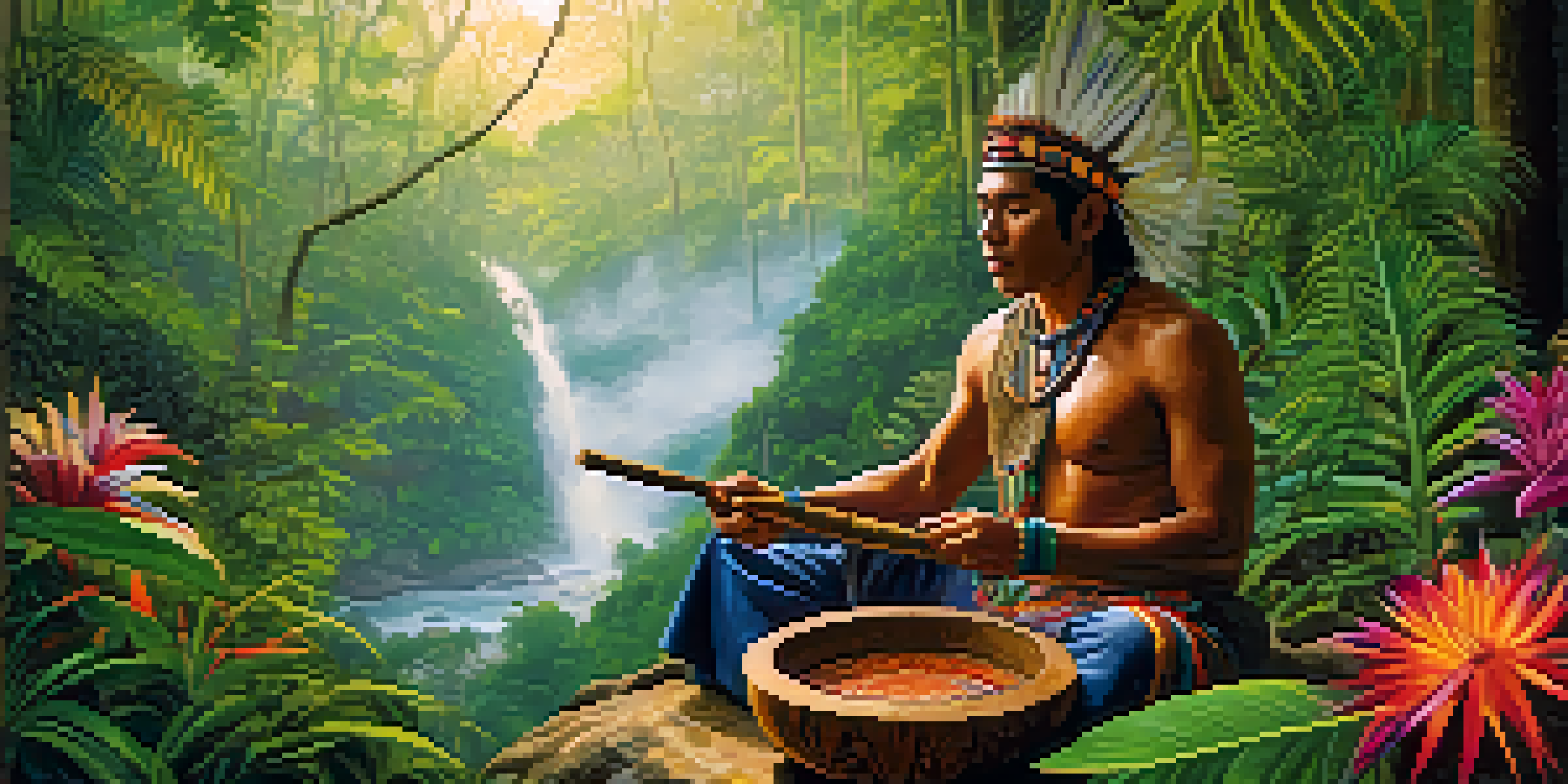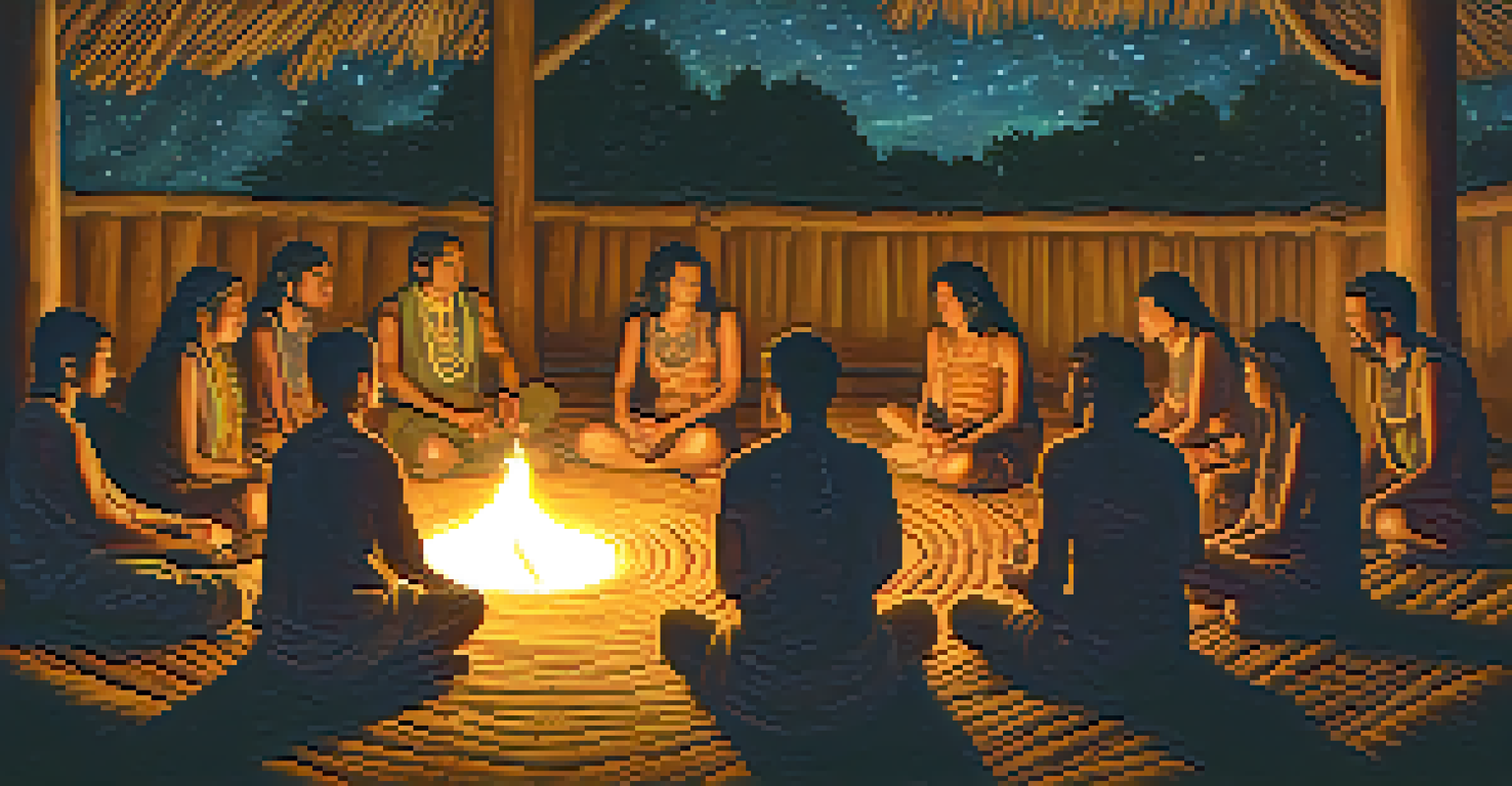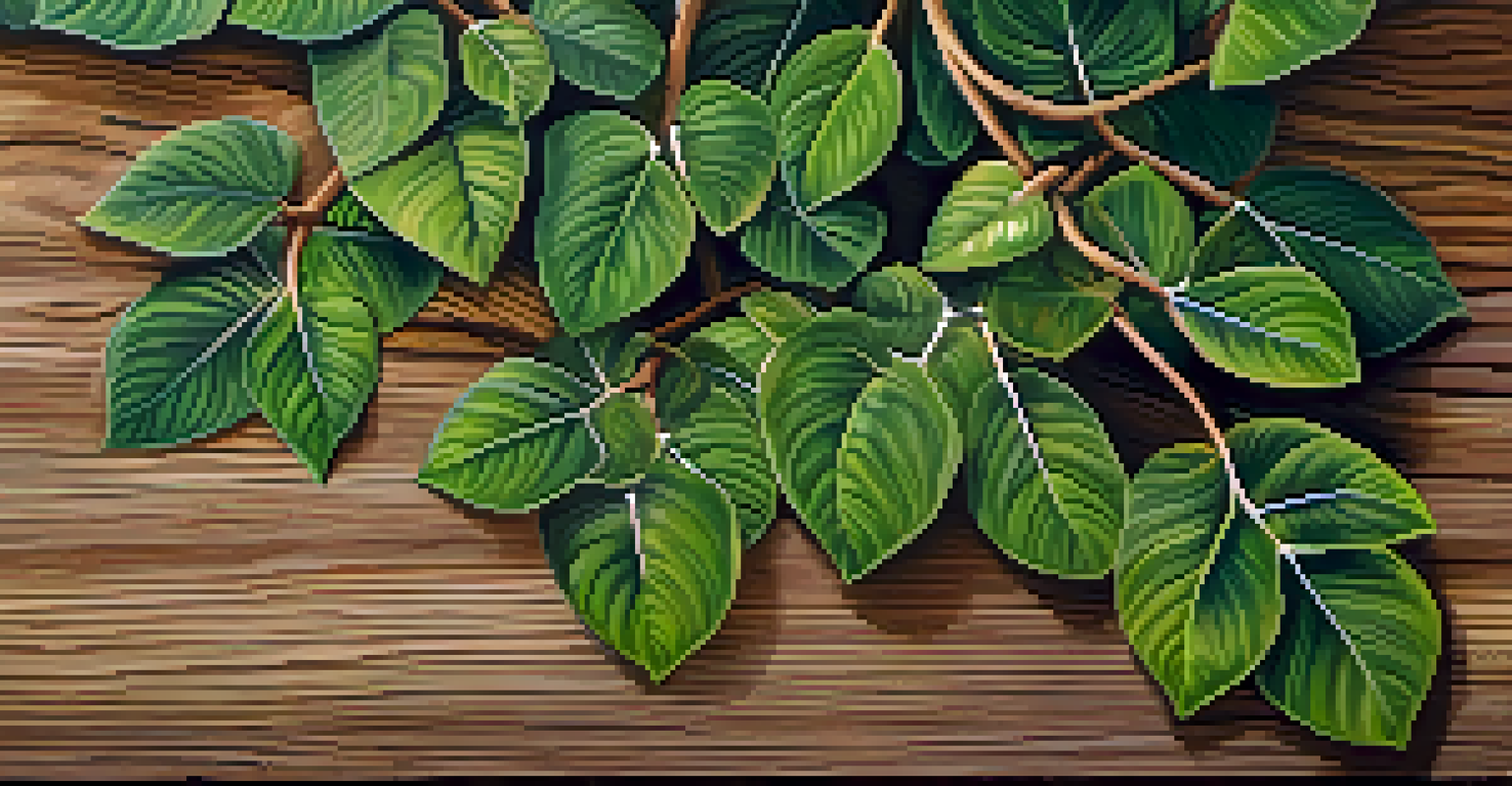Globalization's Influence on Ayahuasca Traditions and Rituals

Understanding Ayahuasca: Roots and Rituals
Ayahuasca is a traditional Amazonian brew made from the Banisteriopsis caapi vine and the Psychotria viridis leaf. For centuries, indigenous communities have used it in spiritual and healing rituals, believing it opens pathways to the spirit world. These ceremonies often involve chanting, music, and the presence of a shaman, who guides participants through their journeys. This rich cultural heritage is deeply intertwined with the identities of the communities that practice it.
Cultural exchange is a two-way street; it requires understanding and respect from all parties involved.
As globalization has progressed, the allure of Ayahuasca has expanded beyond its traditional boundaries. People from various backgrounds now seek out these experiences, drawn by the promises of healing and self-discovery. This growing interest raises questions about cultural appropriation and the preservation of indigenous traditions. The challenge lies in maintaining the integrity of these ancient practices while accommodating a diverse group of participants.
The evolving landscape of Ayahuasca rituals reflects broader trends in globalization, where traditional practices can both flourish and face dilution. As more individuals participate, it becomes crucial to honor the origins of these rituals. By understanding their significance, we can appreciate the depth of the Ayahuasca experience, ensuring that its transformative potential is respected and preserved.
The Role of Western Interest in Ayahuasca
Western interest in Ayahuasca has surged, particularly in the last two decades, with wellness and spirituality trends gaining momentum. Many travelers venture to South America, hoping to find enlightenment or healing through Ayahuasca ceremonies. This influx of participants has led to an increase in retreat centers catering to this demand, often run by both locals and foreigners. While this has created economic opportunities, it also raises concerns about authenticity and sustainability.

Many retreat centers aim to provide a safe and authentic experience, but the commercialization of Ayahuasca can lead to the commodification of sacred traditions. Some centers prioritize profit over genuine cultural exchange, which can result in a diluted experience for participants. This often leads to a superficial understanding of the rituals, stripping away the deep spiritual significance that these practices hold for indigenous communities.
Ayahuasca's Cultural Significance
Ayahuasca rituals are deeply rooted in indigenous traditions, emphasizing the need for respect and understanding among participants.
As the Western world continues to embrace Ayahuasca, a dialogue emerges about the responsibilities of both participants and organizers. It is essential for those seeking these experiences to approach them with respect and openness. Engaging authentically with local traditions can foster a more meaningful connection to the Ayahuasca experience, ensuring that it is not just a trend, but a profound journey of self-discovery.
Cultural Exchange vs. Appropriation
The growing popularity of Ayahuasca raises important questions about cultural exchange versus cultural appropriation. Cultural exchange is a mutually beneficial sharing of traditions, while appropriation often involves taking elements from one culture without understanding or respecting their significance. In the context of Ayahuasca, this distinction can become blurred, leading to tensions between indigenous practices and their global adaptations.
Healing is a journey, not a destination, and Ayahuasca is a powerful guide on that path.
Many indigenous communities emphasize the importance of context and intention in understanding Ayahuasca. When outsiders participate in rituals without grasping their cultural roots, it can undermine the spiritual essence of the experience. This disconnect can lead to a superficial engagement with the practice, which is often perceived as disrespectful by indigenous practitioners. The challenge lies in navigating these nuances while promoting a genuine appreciation for the traditions.
Encouraging respectful cultural exchange involves education and dialogue. By fostering understanding among participants about the significance of Ayahuasca and its rituals, we can honor the heritage of indigenous peoples. This approach not only enriches the experience for outsiders but also helps preserve the integrity of Ayahuasca traditions in a globalized world.
The Impact of Technology on Ayahuasca Practices
Technology has profoundly influenced the way people access and engage with Ayahuasca traditions. Social media platforms and online forums provide a space for sharing experiences, insights, and recommendations about Ayahuasca retreats. This digital accessibility has amplified interest and awareness, allowing more individuals to explore these spiritual practices from afar. However, this also comes with the risk of misinformation and the spread of unverified claims.
The rise of online resources has led to the proliferation of various interpretations of Ayahuasca ceremonies. While some practitioners strive to maintain authenticity, others may deviate from traditional practices to cater to a broader audience. This shift can dilute the original intent of the rituals, raising concerns about the integrity of the experiences being offered. Participants must remain vigilant and discerning when selecting retreats or facilitators.
Western Interest and Its Impact
The surge in Western interest in Ayahuasca raises concerns about commercialization and the authenticity of spiritual experiences.
Despite these challenges, technology can also facilitate meaningful connections between practitioners and indigenous communities. Virtual platforms can serve as educational resources, fostering understanding and respect for the cultural significance of Ayahuasca. By leveraging technology thoughtfully, we can create a bridge that honors traditional practices while inviting new generations to engage respectfully with these rich spiritual traditions.
Globalization and the Evolution of Ayahuasca Rituals
Globalization has inevitably led to the evolution of Ayahuasca rituals, as these practices adapt to new contexts and audiences. As more people participate in ceremonies outside their original cultural settings, variations in the rituals are emerging. Some facilitators blend traditional elements with modern practices, creating unique experiences that may resonate with a broader audience. While this can enhance accessibility, it also raises questions about the authenticity of these new adaptations.
These evolving rituals often reflect a fusion of different cultural influences, which can be both enriching and problematic. On one hand, this blending can create innovative practices that resonate with diverse participants. On the other hand, it risks overshadowing the original cultural significance and spiritual depth of Ayahuasca traditions. Striking a balance between honoring tradition and embracing evolution is a delicate task.
As Ayahuasca rituals continue to evolve, it's essential for both participants and facilitators to remain aware of their roots. Engaging with the tradition respectfully and understanding its historical context can help preserve its integrity. By doing so, we can ensure that Ayahuasca remains a powerful tool for healing and transformation, regardless of the cultural setting in which it is practiced.
Ayahuasca and Global Mental Health Trends
In recent years, Ayahuasca has gained attention within the global mental health conversation. As more individuals seek alternative therapies for mental health issues, the brew has emerged as a potential solution for those struggling with depression, anxiety, and PTSD. Many participants report transformative experiences that lead to profound personal insights and emotional healing. However, it's crucial to approach these claims with a balanced perspective.
While anecdotal evidence supports Ayahuasca's potential benefits, scientific research is still catching up. Studies examining the effects of Ayahuasca on mental health are emerging, but the complexities of individual experiences make it challenging to draw definitive conclusions. As interest in Ayahuasca grows, so does the need for rigorous research to validate its efficacy and safety. Participants must remain informed and cautious as they navigate their healing journeys.
Evolving Rituals Amid Globalization
Globalization is transforming Ayahuasca rituals, creating new adaptations that risk overshadowing their traditional cultural significance.
Integrating Ayahuasca into the broader mental health discourse presents both opportunities and challenges. On one hand, it can offer individuals alternative pathways to healing that resonate with their personal beliefs. On the other hand, it risks oversimplifying mental health issues and promoting a one-size-fits-all solution. As we explore Ayahuasca's role in mental health, it's essential to maintain an open dialogue that respects individual experiences while advocating for comprehensive mental health care.
Future Directions for Ayahuasca Traditions
As globalization continues to shape Ayahuasca traditions, the future of these practices remains uncertain yet hopeful. There is a growing awareness of the need to protect indigenous knowledge and ensure that practices are not diluted or misrepresented. Collaborative efforts between indigenous communities and global participants can foster mutual respect and understanding, creating a space for authentic cultural exchange. This shared journey can lead to richer experiences for all involved.
Furthermore, the ongoing dialogue about cultural appropriation and the importance of consent in cross-cultural interactions is gaining traction. As more people engage with Ayahuasca, the conversation surrounding ethical practices is becoming increasingly relevant. This shift encourages participants to approach their experiences with an attitude of respect, curiosity, and willingness to learn. By prioritizing these values, we can contribute to a more sustainable future for Ayahuasca traditions.

Ultimately, the future of Ayahuasca rituals will depend on the collective efforts of all stakeholders involved. By nurturing genuine connections and honoring the roots of these practices, we can ensure that Ayahuasca continues to be a source of healing and transformation. As we navigate this evolving landscape, it's essential to remain open to new insights while staying grounded in the rich cultural heritage that has shaped Ayahuasca for generations.